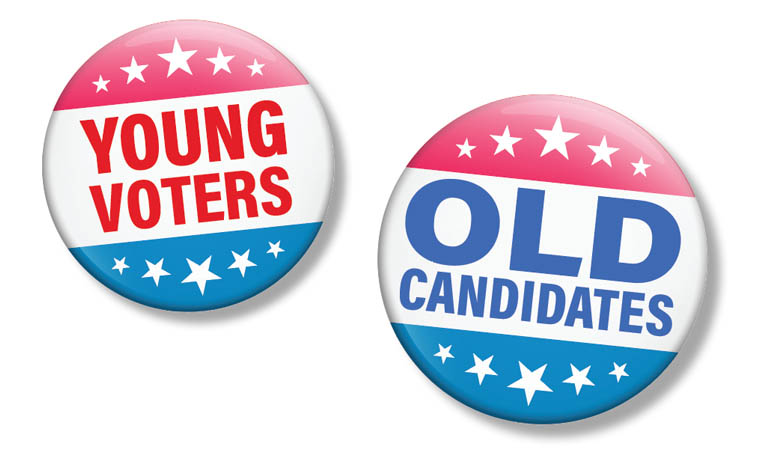By ZACHARY FLETCHER
Later this year, I will most likely vote for a presidential candidate who has spent more time in the public sphere than I have spent alive.
If the race for America’s top elected official continues as expected, the president will be in their 80s by the end of the next term. The two leading presidential candidates—Joe Biden (81) and Donald Trump (77)—are more than 50 years my senior.
Whether we agree it should be an issue or not, age is on the ticket in 2024. In a poll released last summer, USA TODAY reported that “For Biden, 37% of Democratic and Independent voters say the 80-year-old president’s age makes them less likely to vote for him…” A different poll, also from 2023, found that 77% of people see Biden as “too old to be effective for four more years.” Ageism is rampant in our society, but do these numbers reflect ageism or perhaps something more?
Young Voters’ Malaise
Young voters have a unique relationship to this upcoming election—few, if any, candidates on the ballot represent someone from their generation, yet the policies they do or don’t enact will impact these voters the most.
Bret, 25, works as an engineer in Tacoma, Wash., and has friends and family who think politicians should retire when they get older and worries about Congress not being able to regulate things like social media effectively. “Term limits might help some of that,” he tells me, “But it doesn’t address the root problem of elections being bought and paid for.”
Drew Palmer, 24, an optical engineer living in Berkeley, Calif., says he started thinking about age in politics within the last three years but has a different view: “I think wisdom and experience is a key part of being a politician,” he says. Palmer shares that his father brought up the idea of “age as experience” to him. Voters “would lose a lot” if you set something like term limits, he adds.
But Palmer does think about the age requirements in place to hold office, as well. “If there’s a lower age limit, why can’t there be an upper age limit?” he says.
“I value age in voting but there’s not that much choice for me as a voter as—in many cases—the options are pretty much all the same,” says Allie Highsmith, 24, a student currently voting in the U.S. from abroad. Highsmith only recalls a few previous voting decisions that were influenced by age.
The lack of choices young voters face in age began as an unspoken starting point for this article. But instead of talking about age itself, which I was anticipating, I found Bret and Palmer quickly pivoting to policy solutions like federal age and term limits. We skipped over age as a metric and went straight to exploring solutions to ease the malaise they feel around voting.
It’s Not the Number
I spoke with my cohorts to get a sense of how or if the ages of our current candidates would impact their voting choices and what they would change if they could. Their opinions do not, by any means, represent younger voters as a group. However, I found myself on common ground with many of their points—on term limits, age restrictions, and others. One of my takeaways is that someone’s chronological age may not be as important as acknowledging how cultural biases around leadership traits can impact our perception of a candidate’s potential effectiveness as a leader.
“Trump gives this impression of being very vigorous and forceful and all of these things that sort of connote an amount of energy that Biden does not project,” says Thomas Jankowski, the associate director for research at the Wayne State University Institute of Gerontology who also holds a Ph.D. in Political Science.
“Biden’s always had a very soft voice. He speaks softly. He’s had a speech impediment, which he still works to overcome, that gives the impression of his speech being kind of halting and not particularly smooth,” Jankowski adds. Palmer brought up the popular meme of “Sleepy Joe,” a nickname used by Trump in a tweet for President Biden. It has since become the subject of political research and widespread internet memes.
Bernie Sanders, 82, escapes some stereotypes of aging and has been widely supported by younger voters. “Why don’t people think of his age as being a problem?” says Jankowski. “Well, because Bernie Sanders is a tornado, you know? He speaks very forcefully. He’s got a lot of energy and so people don’t associate that with age.”
National media focus on President Biden’s and other national leaders’ ages may have tapped into our underlying cultural age biases. Both Palmer and Bret separately mentioned the issue of cognitive decline in older candidates, an issue covered by national outlets in 2023 after gaffes by Senate Minority Leader Mitch McConnell and the late Senator Dianne Feinstein.
“When anything having to do with older adults is covered, it seems like there’s always this sort of bifurcated view of them either as sort of a wise sage or the doddering fool … when most older adults are just people,” Jankowski says.
Bridging the generational divide will require everyone—at every age—to step up and be ready to work together supporting policies that ensure a bright and dynamic future for all. “I really hate the idea of generations being at odds,” Jankowski says. “Because every young person, if they’re lucky, is going to get old.”
Zachary Fletcher is a freelance journalist covering aging and other news, most recently for The Kitsap Sun/USA TODAY. His work has appeared in PBS’s Next Avenue and The Sacramento Bee, among other publications. He lives in Seattle with his partner. Learn more about him at https://fletcherzachary.weebly.com/.


